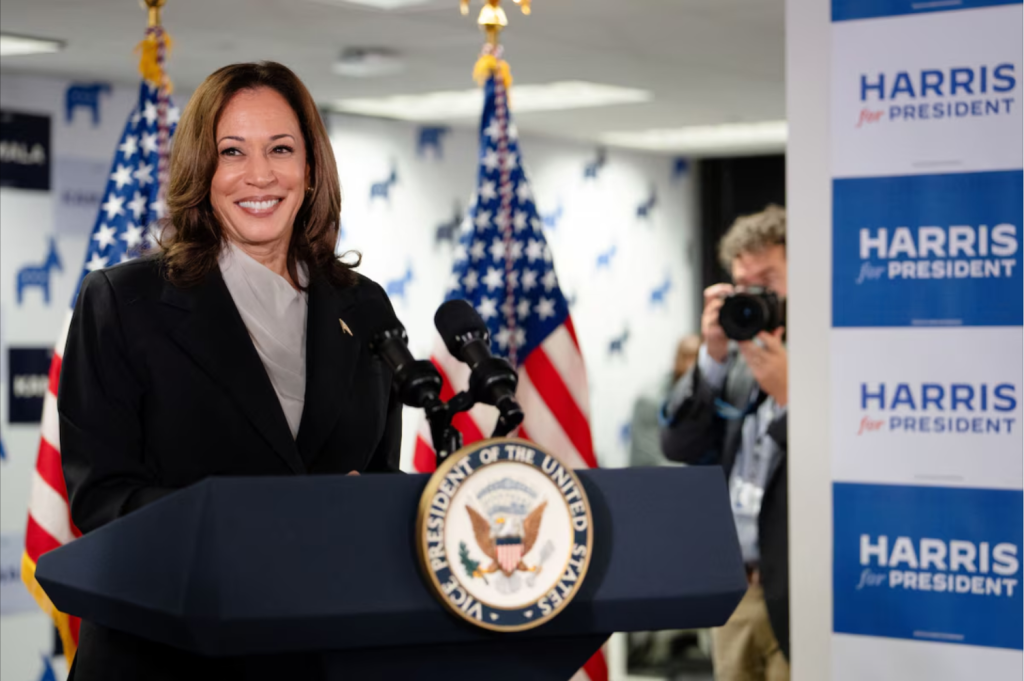
Vice President Kamala Harris will campaign in the critical battleground state of Wisconsin on Tuesday for the first time as a presidential candidate after enough Democratic delegates pledged to endorse her, clearing her path to the nomination.
Harris has become the party’s presumed nominee after President Joe Biden withdrew from his reeelction campaign on Sunday, following weeks of party acrimony and internal polls showed his support collapsing in a battle against Republican rival Donald Trump.
Less than 36 hours after Biden endorsed Harris, she secured the nomination on Monday night by winning the pledged support of a majority of the party’s delegates who will determine the nomination, the campaign said.
“Tonight, I am proud to have secured the broad support needed to become our party’s nominee,” Harris said in a statement late Monday night. “I look forward to formally accepting the nomination soon.”
An unofficial survey of delegates by the Associated Press showed Harris with more than 2,500 delegates, well over the 1,976 needed to win a vote in the coming weeks. Delegates could still, technically, change their minds but nobody else received any votes in the AP survey; 54 delegates said they were undecided.
The Wisconsin trip offers another opportunity for the 59-year-old former California prosecutor to reset the Democrats’ campaign and make the case that she is best positioned to beat Trump. Harris is scheduled to deliver remarks at a political event in Milwaukee at 1:05 p.m. CDT (1805 GMT).
She offered a sense of how she plans to attack Trump on Monday, referring to her past of pursuing “predators” and “fraudsters” as San Francisco district attorney and California attorney general.
“So hear me when I say I know Donald Trump’s type,” she said of her rival, a convicted felon who was found liable for sexual assault in civil court. Other courts have found fraud was committed in his business, charitable foundation and private university.
Wisconsin is among a trio of Rust-Belt states that include Michigan and Pennsylvania widely considered as must-wins for any candidate, and where Biden was lagging Trump.
“There are independents and young people who did not like their choices, and Harris has a chance to win them,” said Paul Kendrick, executive director of the Democratic group Rust Belt Rising, which does routine polling in the battleground states where voting preferences can swing either way.
FUNDRAISING WINDFALL
Harris has also been raking in campaign contributions. Her campaign said Monday she had raised $81 million since Biden stepped aside on Sunday, nearly equaling the $95 million that the Biden campaign had in the bank at the end of June.
Hollywood donors ended their “Dembargo” on political donations, as fundraisers and celebrities from rapper Cardi B to Oscar winner Jamie Lee Curtis and TV producer Shonda Rhimes endorsed Harris.
Meanwhile, Trump and his allies have tried to keep Harris tethered to some of Biden’s more unpopular policies, such as immigration
“Kamala Harris’ dismal record is one of complete failure and utter incompetence. Her policies are Biden’s policies, and vice versa,” Trump spokesperson Steven Cheung said.
Whether she can turn around slumping polls in key states remains an open question.
In interviews with half-dozen leading Democrats in Wisconsin, they said Harris offers the party the opportunity to push the reset button and animate voters who were unenthused about Biden and Trump.
Milwaukee County Executive David Crowley said Harris, the first Black American and first South Asian American to be elected vice president, will also help bring back crucial Black voters.
“Many of them didn’t come along because they were distracted by his age, distracted by his appearance,” Crowley said.
Replacing Biden atop the ticket has also revved up speculation about who might join Harris as a vice presidential candidate.
The short list of people being discussed included Kentucky Governor Andy Beshear, U.S. Secretary of Transportation Pete Buttigieg, North Carolina Governor Roy Cooper, Arizona Senator Mark Kelly, Pennsylvania Governor Josh Shapiro, Illinois Governor J.B. Pritzker, and Michigan Governor Gretchen Whitmer, according to people familiar with internal policy discussions.